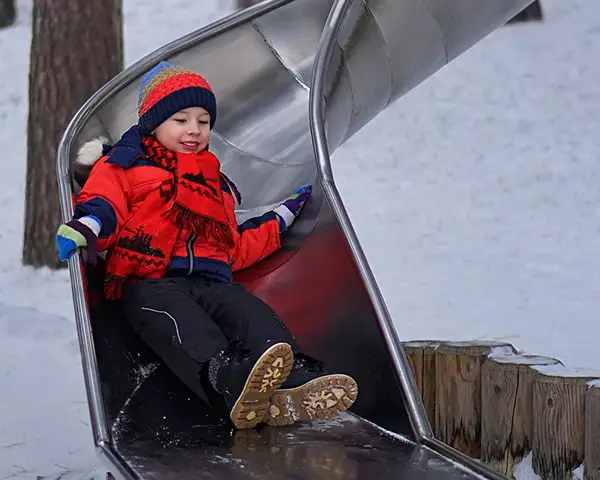Winter can bring lots of family fun — whether this involves sledding and romping around in the snow or just hanging around together at home. Here are a few ideas I give to parents to keep their kids warm, healthy and safe during winter.
How to Dress Your Kids (Not Like Little Adults)
Parents with babies and younger kids should:
- Adjust winter clothes for children’s needs. Dress babies and young children in one more layer of clothing than an adult would wear in the same conditions.
- Keep exposure to the cold at a minimum.
and young children don’t have the same tolerance for cold that adults do. It’s important to limit time outside. - Don’t forget winter accessories. Remember warm boots, gloves or mittens and a hat, which make a big difference in keeping young children and babies comfortable.
Simple Ways to Avoid Winter Colds
It’s a common myth that cold weather causes colds, but it does not. Colds are caused mainly by viruses that we are more commonly exposed to in the winter.
Viruses are spread even more easily when children are in school and in close contact with each other, typically through respiratory droplets in the air and on hands.
Prevent colds and the flu by getting kids to:
- Use soap and water. Washing their hands frequently will reduce the spread of germs.
- Cover their mouth. Sneezing or coughing into the bend of their elbows also helps prevent spreading germs.
- Get immunized. Keep vaccinations current, including the flu shot (for children 6 months and older).
Be Safe on Sleds and Snow Tubes
- Always supervise children. Injuries can occur quickly when kids are sledding or snow tubing. It’s important to keep a close eye on them.
- Keep away from motor vehicles. Often, sledding hills are not far from highways or roads. It’s important to keep a safe distance.
- Sled in proper ‘form.’ Kids can prevent injuries by sledding feet first or sitting up, instead of lying down head-first.
- Find a clear area. Pick a sledding location that is clear of obstructions like trees or fences and is covered in snow.
- Choose a good sledding hill. A sledding hill should not be too steep, with a slope of less than 30 degrees, and should end with a flat runoff.
Be Safe on Skis and Snow Boards
- Dress in layers. If you begin to sweat, remove layers as needed to stay dry. Wet clothes can cause your body to chill and can lead to hypothermia or frostbite.
- Wear a helmet. It’s important to protect your head from injury.
- Protect skin. Keep your skin from being exposed to harsh temperatures to avoid frostbite. Be especially careful with small areas of your body, such as your hands, feet and ears.
- Be aware of weather conditions. Consider going inside if the temperature drops below 0 degrees F (-17.8 C).
Be aware of frostbite symptoms. If you notice your child skin turning red or becoming numb, move to a warmer location and protect them from further exposure. Use warm water or blankets to raise their body temperature.
In winter, there are lots of options for fun. Enjoy the snow, and stay safe.
For more information, visit health.clevelandclinic.org

